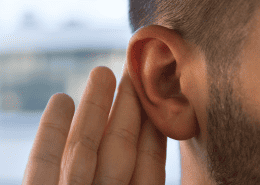
Sudden Sensorineural Hearing Loss Requires Treatment
The annual incidence of sudden sensorineural hearing loss is about 1 in 5000 people.
Sudden sensorineural hearing loss is a rapid onset of hearing loss over a 72-hour period. Normally, it only occurs in one ear. Other symptoms often associated are dizziness and ringing in the ears. Although it can affect anyone, it’s most common between the ages of 50 & 60.
Sudden sensorineural hearing loss is a serious condition. Treat it as a medical emergency.
An Audiologist and an Ear, Nose, and Throat physician should both perform thorough tests. Further testing may include an MRI, blood tests, and balance tests.
Causes of sudden sensorineural hearing loss.
Ninety percent of sudden sensorineural hearing loss cases are unknown. Many cases happen after a person has suffered from a viral or bacterial infection. Other reported causes of sudden sensorineural hearing loss include:
- Autoimmune disease
- Lime disease
- Acoustic neuromas
- Multiple sclerosis.
Treatment of sudden sensorineural hearing loss
Medical treatment should be obtained as soon as possible to better the prognosis of sudden sensorineural hearing loss. The most common treatment is a course of corticosteroids. The majority of people with sudden sensorineural hearing loss will recover some degree of hearing. A small percentage of people will have symptoms that worsen.
If hearing loss becomes permanent, there are options available for patients. Hearing aids or implantable devices can help with hearing loss.
If you suspect that you may have sudden sensorineural hearing loss, seek medical help right away.

What Happens When You’re Diagnosed With Sudden Sensorineural Hearing Loss (SSHL)?
Hearing Loss
Hearing Relief: Do Hearing Aids Help Tinnitus Sufferers?
Hearing Aids
Can the Ringing in the Ears, Also Called Tinnitus, Be Cured?
Common Questions - General, Hearing and Disabilities



Share this entry